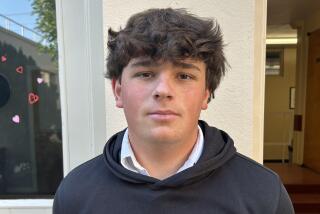It Takes Heart (Transplanted) to Compete in This Athletic Event
- Share via
Three years ago, Oland Thompson spent his days and nights on his living-room couch.
Unable to lay down for fear that his heart would stop beating, the Pacific Beach resident couldn’t sleep in his own bed. The simplest tasks, such as cooking dinner or taking out the trash, required major physical effort. All he could do was watch television, crochet and read.
His days as a competitive tennis player were a distant and painful memory. At 25, he was dying.
A heart transplant gave Thompson his life back.
This weekend, the 28-year-old will return to the sports world, along with hundreds of other transplant patients, in the 1992 U.S. Transplant Games in Los Angeles, a celebration of renewal for those who have found new life through other people’s organs.
“It’s not a competitive situation, but some of us may enjoy the idea of winning,” Thompson said, flashing a grin.
The Transplant Games, which went national in 1990, are meant as a symbol of the progress made in transplanting organs, and Thompson is offering himself as living proof of the active and vital life available to transplant recipients.
In 1990, 15,000 transplants were performed; now 26,000 Americans are waiting for transplants, according to the United Network of Organ Sharing.
The number of donors has stayed about the same while the need for transplants has increased, because advances in pharmaceuticals and procedures have made transplants a more viable lifesaving alternative, said Terri Clausen, heart and lung transplant coordinator for Sharp Memorial Hospital.
The Transplant Games, sponsored by the National Kidney Foundation and two pharmaceutical companies, “help raise the awareness of the public, not only of transplant recipients and the wonderful lives they lead, but the need for organ donations as well,” she said.
Nearly a thousand transplant recipients will participate in 10 events, including golf, track and field, swimming and bicycling.
Thompson will travel to the games with several San Diegans who also have gone through organ transplants. Thompson is a friend of many of them. They keep in touch, bonded by a shared experience.
“It’s an appreciation of life,” said Thompson, a manager at a La Jolla department store. “Most of us have a need to do something, something important.”
Thompson, who describes himself as more “spiritual” than he was before the transplant, believes his purpose is to educate people about transplants, to make them realize how important it is to donate organs. He offers himself as living proof that transplant recipients no longer have to live limited lives.
“I tell people, just because you have a transplant doesn’t mean you’re not a productive person,” he said.
A native of New York, Thompson was born with an enlarged heart, but with the help of medication it didn’t slow him down. He played on the tennis team in high school and college, and prided himself on his physical condition.
When he was 21, he was re-diagnosed with cardiomyopathy, a more serious weakening of the heart muscle. After moving to San Diego in 1987, he was suddenly stricken with congestive heart failure, which is characterized by the heart’s inability to pump enough blood, causing difficulty in breathing, retention of fluids and other serious symptoms.
By 1989, his condition had degenerated to the point that he could no longer work. The condition made him lethargic and forgetful. The medication nauseated him. Confined to his couch, the 6-foot-tall Thompson saw his weight plummet to 138 pounds.
Finally, he was told that he would need a transplant if he hoped to live an active life.
Thompson was lucky. He only had to wait a few days to get a new heart once he was put on the waiting list. It was simply a question of timing, a suitable heart becoming available at just the right moment.
It’s an aspect of his story he feels uncomfortable talking about.
“I go to support groups, and I see people who say they’re waiting (for organs),” Thompson said. “I know people who died waiting. I didn’t go through all that.”
A few years ago, transplant recipients were told they would have to wait two to six months for a donor; now the wait is six months to a year, Clausen said.
He was lucky in other ways. His family and friends supported him, taking out his trash and cooking his meals. His employer, I. Magnin, was understanding and flexible.
“Everybody who worked with him was aware he had a serious illness and that he needed our support,” said Kay Cline, general manager of the store.
His recovery got off to a slow start, with recurring symptoms that his body was rejecting the heart. A pacemaker had to be installed after his heart regularly slowed to dangerous levels while he was sleeping.
But within three months of the transplant, he was back at work and ready to start exercising again. He distinctly remembers his first stab at playing tennis. To a degree, he realized he was going through denial, refusing to admit that maybe he wasn’t ready to exercise.
“I used to do this yesterday, why can’t I do it today?” he remembers asking himself, while vividly recalling that just a few months earlier he couldn’t walk up a flight of stairs without breathing hard.
Now he’s back up to 195 pounds and hopes to get up to about 225. He says he has become “obsessed” with weightlifting, and wants to develop “the physique of a bodybuilder.”
If anything, he ignores his condition too much.
“I go out all the time,” he said with a laugh. “If people want to know what’s going on in San Diego, they ask me. I enjoy myself. I don’t hesitate to do things.”
Thompson differs from most organ recipients “in his motivation and desire to do more than the average transplant patient,” said Clausen of Sharp Memorial. “It’s not like they all go back to body building and being so physically fit.”
Thompson “pushes himself to the max,” which is perfectly OK for his health, Clausen said. The more transplant patients do the better, she said, though they are discouraged from participating in contact sports.
As a tennis player, Thompson still plays a base-line style. He can move as quickly as he did before. Only when he races for a shot does he notice a difference from his pre-transplant game.
“A lot of time I get to a shot, but when I try to recover and get to the next shot, it’s not always there,” he said.
He’s become something of an inspiration to his co-workers, Cline said. At corporate meetings, they love to point out his transplant success story to the out-of-town executives. One day, Thompson brought in a device to check everyone’s blood pressure, just to make sure they were in good shape.
“I’ve learned that, no matter how old you are, it’s good to fill that (donor) card out,” said Cline. “Thank God the person whose heart he has was willing to do it, or he might not be alive today.”






